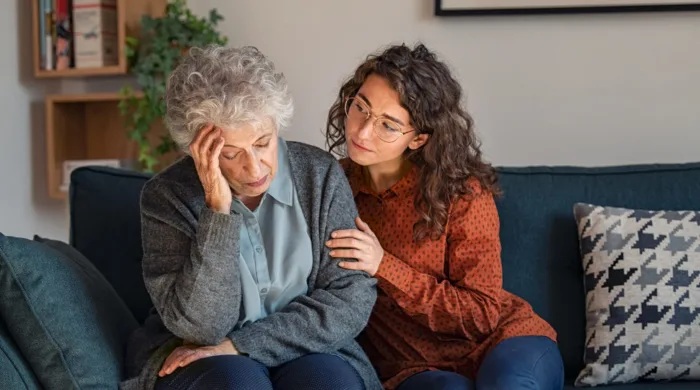Though the words Alzheimer’s and Dementia are often used interchangeably, they are not the same condition. In this post, we’ll discuss how to distinguish between the two; identify the signs and symptoms associated with each; explore common treatments and impacts to family and friends, and provide information on where to get help if you or a loved one suffers from Alzheimer’s or Dementia.
What is Alzheimer’s
Alzheimer’s is the most common form of dementia. It’s a progressive disease that affects memory, thinking and behavior. Most patients have trouble with simple daily tasks as the condition worsens over time.
The specific cause of Alzheimer’s disease is unknown. However, one feature of the disease is an abnormal buildup of proteins in the brain, which deposit amyloid plaques and tau tangles that surround brain cells.
What is Dementia
Dementia, categorized as a syndrome, is characterized by a loss of memory, language, problem-solving and a decline in cognitive abilities that is caused by abnormal brain changes. There are several different types of dementia:
- Alzheimer’s is related to the build up of plaques and tangles in the brain that are thought to interfere with nerve function.
- Vascular dementia is caused by blood vessel blockage and microscopic bleeding in the brain.
- Lewy Body dementia is caused by decaying brain tissue.
- Mixed dementia can be caused by vitamin deficiencies or thyroid issues.
- Frontotemporal dementia may have a genetic cause, but that has not yet been definitively proven.
What are the symptoms of Alzheimer’s and Dementia?
Alzheimer’s and Dementia symptoms can vary significantly from patient to patient, and may include:
- Short-term memory loss
- Difficulty with language (finding correct words)
- Forgetting to attend appointments
- Paying bills late or not at all
- Difficulty planning or preparing meals
- Losing every day items such as keys, wallet, mobile phone
- Getting lost while driving or traveling to a familiar location
- Trouble with motor skills
- General confusion
- Depression
- Anxiety
- Paranoia
- Hallucinations
- Agitation
- Repetition of conversations and questions
- Hostile behavior
- Spatial issues
- Forgetting the names of friends, family or colleagues
- Withdrawal from social activities
- Mood swings
Symptoms may increase and worsen over time, depending upon how the condition progresses.
At what age do Alzheimer’s and Dementia symptoms start?
Initial symptoms of Alzheimer’s disease commonly occur in patients who are in their mid-60s, though early onset cases can begin in patients as young as in their 30s.
Whereas for dementia, most patients experience their first symptoms in their 60s, however this may be preceded by other cognitive changes in the 30s, 40s or 50s.
What are common treatments for Alzheimer’s and Dementia?
There is only one medication approved to treat Alzheimer’s disease—a human antibody called Aducanumab, which helps reduce amyloid plaques by targeting the beta-amyloid protein. Doctors also may prescribe physical exercise, as studies indicate it may help slow the decline of cognitive impairment.
For dementia, treatment medications may include cholinesterase inhibitors that help boost levels of a chemical messenger for memory, or Mematine, which regulates the activity of glutamate (also a chemical messenger). Occupational therapy, lifestyle modifications, and the simplification of tasks and routine may also be beneficial to patients with dementia.
How do Alzheimer’s and Dementia impact loved ones?
Those diagnosed with Alzheimer’s and dementia aren’t the only ones who suffer as a result of these conditions. Caring for and monitoring the progression of a patient’s symptoms can be incredibly painful and draining for loved ones and caregivers.
Caregivers are at a greater risk for chronic conditions, sleep disorders and cardiovascular issues than non-caregivers. Family and friends also often experience psychological distress such as anxiety and depression as well as financial strain and a decrease in social interactions, which can result in the loss of a sense of community.
Where to get support for Alzheimer’s or Dementia
If you or a loved one are having memory issues, or need help navigating Alzheimer’s or dementia treatments, contact WWMG Family Practice to schedule an appointment. Our providers can help assess the situation and refer out to a neurologist as needed.
